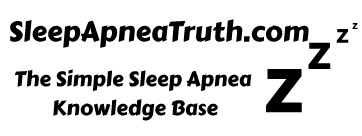There are many sleep apnea treatments to choose from, as well as new ones that are currently under research and development. We’ll talk about the most basic first, and move on to the heavier duty options as well as touch on those that are under development.
Side Sleeping:
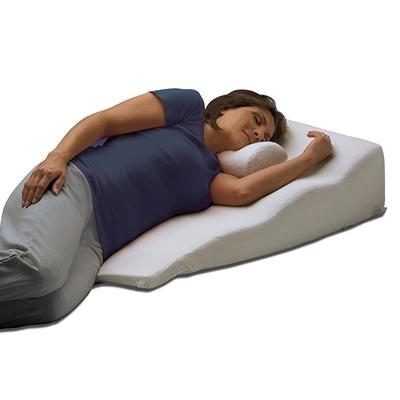 Yes. For some, it really could be this simple. For people with very minor sleep apnea, sleeping on your side can allow your airway to remain open. This will allow for better sleep. If you think you may have sleep apnea, this is a great first option to try for a few nights to see if you’re feeling any relief.
Yes. For some, it really could be this simple. For people with very minor sleep apnea, sleeping on your side can allow your airway to remain open. This will allow for better sleep. If you think you may have sleep apnea, this is a great first option to try for a few nights to see if you’re feeling any relief.
If things don’t improve and you’re still having symptoms, that would be a great time to address the issue of sleep apnea with your doctor. The biggest takeaway should be this: Don’t sleep on your back! This is actually decent advice for a better night sleep for almost everyone. But it is especially important if you suffer from sleep apnea!
Weight Loss:
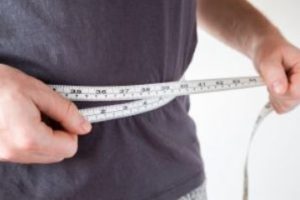 If you’re experiencing obstructive sleep apnea that is due to weight gain, then losing weight is going to be a great step in improving or eliminating it. Unfortunately, it’s often a difficult goal.
If you’re experiencing obstructive sleep apnea that is due to weight gain, then losing weight is going to be a great step in improving or eliminating it. Unfortunately, it’s often a difficult goal.
We live in a world with plenty of delicious temptations. Further, sleep apnea reduces your metabolic rate, making it harder to lose the weight. And even worse, largely in the case of men, sleep deprivation is proven to lower your testosterone, further wreaking havoc on your metabolism.
Still, any healthy lifestyle changes you can make will put you on the road to success to eliminating your sleep apnea and feeling better!
CPAP Machines (Or Others Such as BiPAP or APAP)
The most common and well-known treatment option for both obstructive and central sleep apnea are CPAP machines. CPAP stands for “Continuous Positive Airway Pressure”. It is exactly like it sounds. Run the machine and wear the mask while you sleep. It will give you continuous pressure to keep your airway open and prevent apnea events. You would go for your sleep study, obtain your machine, and a technician will then calibrate your machine for the proper amount of pressure and airflow. Done! Sort of.. 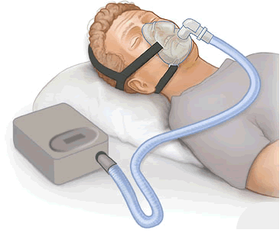
CPAP machines are a very effective treatment for sleep apnea, but they have one major drawback: They’re not very comfortable, and as a result, many people don’t use them! Some studies have shown that a majority of patients have stopped have using their device after three years or so. In fact, many obtain a CPAP machine and never use it at all! This is largely due to comfort. Thankfully, many new kinds of masks/mouthpieces have come out, especially in the last decade. A full face mask is not always a requirement anymore. Some are nose-only, mouth only and so on, allowing you to sleep more comfortably instead of being annoyed by a mask covering your face. Another problem is that insurance companies can also be very strict when it comes to paying for CPAP machines. Again, this is for the simple reason that many don’t use them. Some even opt to track patients’ usage of their devices! While you generally can get insurance companies to pay for your CPAP machine, keep in mind that these are hoops you may have to jump through. Check out this article from NPR on the subject.
There are other options however. The cost of these devices has come down considerably and you could order one online right this second if you wanted to. The cheapest devices can come in under $400! Expensive ones costing several thousand dollars do exist, but are generally not necessary. If you end up having to buy your own machine, figure on spending a solid $500 for a no-frills model. Thankfully many retailers offer financing, which can make these devices easier for almost anyone to afford. Overall, this will likely be your most encountered out of the many sleep apnea treatment options.
CAUTION: CPAP and similar devices are not terribly hard to maintain, but they do need their filters changed, new masks and tubes periodically, and you should seriously consider cleaning your machine thoroughly every once in a while, as dangerous bacteria can grow and be harmful to the user. Consider a dedicated device for this purpose. This will add to cost however.
Sleep Apnea Mouthpieces / Oral Appliances:
One newer and less invasive treatment option for obstructive sleep apnea are oral appliances. These have a range of different functions, from functioning as a mouth guard, to keeping the tongue in place as to keep the user’s airway unobstructed. To find out if this is a viable treatment option for you, talk to your pulmonologist / sleep apnea specialist. In such a case, you would then typically visit a dentist who specializes in oral appliance, have them take an impression of your teeth, and finally receive your custom-made device. There are also some that can be easily ordered online, but you won’t get that custom fit that you may need. Some swear by them, and some have little to no results with them at all. Again, talk to your doctor about trying an over the counter type oral appliance for sleep apnea rather than a better-fitting custom one.
Sleep Apnea Surgery:
Some people may not have sleep apnea due to weight gain, bad sleeping habits, or any of those factors. Some people simply have excess tissue, tonsils, uvula, or neck/throat muscles that are causing their obstruction. For those individuals, surgery for sleep apnea can be a great treatment option. The primary drawback is that these procedures are expensive. A “UPPP” (Uvulopalatopharyngoplasty), one of the most common surgical procedures for sleep apnea, can range from $2,000 to $10,000. Not exactly an option for the sleep apnea sufferer on a budget. One may also consider weight loss surgery to be in this general area, since for many patients, weight loss reduces or eliminates their obstructive sleep apnea. The surgery that will be right for you will ultimately depend on what is obstructing your breathing.
Phrenic Nerve Stimulation:
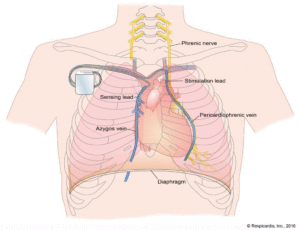 We’ve talked quite a bit about treatment options for obstructive sleep apnea, but what about those who suffer from central sleep apnea? A new and innovative treatment has recently emerged and was approved by the FDA in late 2017. It involves implanting a device that stimulates the phrenic nerve (which controls the diaphragm), causing a patient with central sleep apnea to continually breath during sleep.
We’ve talked quite a bit about treatment options for obstructive sleep apnea, but what about those who suffer from central sleep apnea? A new and innovative treatment has recently emerged and was approved by the FDA in late 2017. It involves implanting a device that stimulates the phrenic nerve (which controls the diaphragm), causing a patient with central sleep apnea to continually breath during sleep.
Some have called this a “pacemaker for breathing”. It detects when you are laying down, waits for a period of time for you to fall asleep, and finally activates during sleep. No hassle, no annoying CPAP machine or mask. There are other similar devices where electrodes are implanted and an exterior device would then be connected to night to control them, but the product by “Remede” is completely implantable with no need for an exterior device. Note: A similar treatment is available for obstructive sleep apnea as well, called “Hypoglossal Nerve Stimulation”, which stimulates the tongue and is proven to be effective. See this article by the FDA on Remede’s Phrenic Nerve Stimulation device:
Supplements for Sleep Apnea?
The evidence for supplements to help sleep disorders is mixed at best, but we’ll cover a few.
Melatonin (avoid!?): While melatonin is a great supplement for things like insomnia, some say it can actually be risky for someone with sleep apnea. This is because it may actually worsen apnea events, or increase them in number, due to falling into a deeper sleep. This may increase your risk of death due to serious apnea events and your body not properly waking up to take breaths when needed. It’s probably best avoided, but consider talking to your doctor about it. More research is definitely needed on something like CBD oil for this purpose. While it probably won’t necessarily help sleep quality, some may claim it might improve mood and so on. As always, take any supplement at your own risk.
Vitamin D: Interestingly, there may be some link between a Vitamin D deficiency, and obstructive sleep apnea. Some data suggests that Vitamin D may improve sleep quality in general. Other sources show that lack of Vitamin D may contribute to weight gain, which in turn puts an individual at increased risk for obstructive sleep apnea. In one study, 98% of obstructive sleep apnea sufferers had a Vitamin D deficiency! While correlation does not equal causation, that is a staggering number. See this article by Sharon O’Brien at Clinical Advisor for more information.
Specialty / Over the Counter Supplements: These are going to be a mixed bag. You also open yourself up to having to experiment with a bunch of different supplements and possible side effects. “Natural” doesn’t mean “safe”. Look at supplements like “NAC” (N-Acetyl-L-Cysteine) at Amazon. Apparently, some studies have shown it can alleviate many of the symptoms of sleep apnea, and some claim it can even extend lifespan (at least in simple organisms). Other studies claim NAC could actually shorten lifespan. What’s the truth? It’s hard to say. These supplements, especially for something like sleep apnea which has many other proven treatments, are a bit of a gamble.
Yohimbine Bark: One group of researchers looked into the effects of Yohimbe Bark for sleep apnea. The theory is that by stimulating the hypoglossal nerve using medication, this will prevent the tongue from relaxing and blocking the airway. Research like this has been tried for a while but none of the supplements did the job. However, this research showed positive results in animal test subjects! Chi-Sang Poon, head of this research project seemed enthusiastic about the prospects of the Yohimbe Bark supplement. However, he did warn that it is risky to use until conclusive evidence is found. You can find out more about this research in this MIT news article.
In Conclusion:
I really hope this article has helped you to understand the major sleep apnea treatment options, as well as others you may find interesting. As always, it is important to talk to your doctor and get a proper medical diagnosis and proper treatment and advice from professionals. Still, it’s nice to know that there are many potential sleep apnea treatments to choose from. Which means you can find out exactly what is right for you! Thank you so much for reading.
Sleep Apnea Articles And Resources:
Sleep Apnea Information (Introduction)
Signs and Symptoms of Sleep Apnea
Diagnosing Sleep Apnea: The Steps
Sleep Apnea Treatments (You are here)
